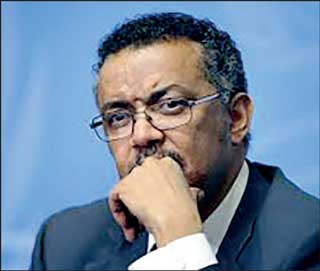Sunday Feb 22, 2026
Sunday Feb 22, 2026
Friday, 29 October 2021 00:00 - - {{hitsCtrl.values.hits}}

Prof. Fred A. Kummerow
By Hemal de Silva
To quote Prof. Fred A. Kummerow, “Heart failure is one of the major causes of death throughout the world. For
 |
| WHO DG Dr. Tedros |
 |
| Dr. Rohan Gunawardena |
Two lipids in the diet, rather than cholesterol, are responsible for heart failure and stroke, Clinical Lipidology, 9:2, 189-204, DOI: 10.2217/clp.14.4)
Prof. Kummerow, a pioneer in the study of dietary contributors to heart disease led a decades-long crusade to remove trans-fats from the food supply. His career started in the 1940s continued till he was 101, maintaining a laboratory at the University of Illinois at Urbana-Champaign often dipping into his own funds to pay the scientists who worked with him.
Professor Kummerow, a maverick and a trailblazer, filed a citizen’s petition with the US Food and Drug Administration requesting that it “ban partially hydrogenated fat from the American diet”. When the FDA failed to respond to his petition for four years – the law requires a response within 180 days – Kummerow, then 98, filed a lawsuit to force the agency to make a determination on his petition. Three months later, the FDA announced a “tentative determination” that trans-fatty acids “are not generally recognised as safe for any use in food”.
On 18 June, 2018, the FDA officially banned the use of trans fats, or partially hydrogenated oils (PHOs), in all foods sold in American restaurants and grocery stores. Removing PHOs, the FDA notes, “could prevent thousands of heart attacks and deaths each year”.
Trans fats are widely known to raise low-density lipoprotein (LDL) levels, lower high-density lipoprotein (HDL) cholesterol levels and increase an individual’s risk of developing heart disease, stroke and type 2 diabetes. Video to Kummerow’s life and work – https://www.youtube.com/watch?v=l0g7zpOg8M0&t=23s.
When WHO announced ‘REPLACE’ on 14 May 2018, Dr. Tedros asked "Why should our children have such an unsafe ingredient in their foods?" He was referring to trans-fatty acid or industrial trans-fat. REPLACE, a step-by-step guide for the elimination of industrially-produced trans-fatty acids from the global food supply.
Eliminating trans fats is key to protecting health and saving lives. Industrially-produced trans fats are contained in hardened vegetable fats, such as margarine and ghee, and are often present in snack food, baked foods, and fried foods. Manufacturers often use them as they have a longer shelf life than other fats. But healthier alternatives can be used that would not affect taste or cost of food.
In Denmark, the first country to mandate restrictions on industrially-produced trans fats, the trans fat content of food products declined dramatically and cardiovascular disease deaths declined more quickly than in comparable OECD countries. (WHO plan to eliminate industrially-produced trans-fatty acids from global food supply – https://www.who.int/news/item/14-05-2018-who-plan-to-eliminate-industrially-produced-trans-fatty-acids-from-global-food-supply)
Looking after your heart: Start young – (September, 2016) (https://www.sundaytimes.lk/160918/mediscene/looking-after-your-heart-start-young-208717.html).
To quote Dr. Rohan Gunawardena,
1. The heart should be looked after from the time of birth. Prevention is the need of the hour, rather than awaiting heart disease and then taking medications lifelong to keep it under control, but never being able to cure it.
2. 60-80% of coronary artery disease can and should be prevented.
3. A majority of people being struck down by heart disease then were 50 years old or above, but gradually we have seen it hitting those between 40 and 50 and then 30 and 40. Another important factor is that more and more women also seem to be vulnerable to coronary artery disease.
4. The time for prevention is childhood, for the initial lesions in the arteries start occurring then. From the time we are born and into our early teens, depending on our lifestyle, slowly, gradually and insidiously atherosclerosis would begin to affect our arteries.
In September, 2016 it was known that prevention is the need of the hour. Five years later have any steps been taken to prevent the intake of trans-fat? At least the simpler way of prevention is available but, unfortunately ignored.
We have in Sri Lanka the species Pentadesma butyracea and probably the only successfully established, mature pilot project that can be seen anywhere in the world. The vegetable fat (Pentadesma) extracted from the seed need not be hydrogenated and if used in processed foods the end product will be free of trans-fat. It is expected to have a lower cost of production and nutritionally better compared to palm oil. Being a perennial tree that will be productive for well over a century, it will be environmentally beneficial than oil palm.
Prevention of CVDs will be the most important benefit pentadesma fat offers to humanity. Please refer, ‘Sri Lanka’s health financing challenge: Outsource to outsmart it’ (https://www.ft.lk/columns/Sri-Lanka-s-health-financing-challenge-Outsource-to-outsmart-it/4-719002)
Why are we waiting?
(The writer can be reached via [email protected])